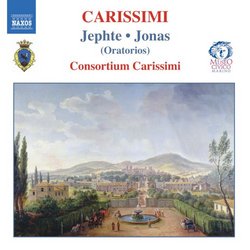| All Artists: Marco Scavazza, Giacomo Carissimi, Vittorio Zanon, Paolo Costa, Consortium Carissimi, Marco Vincenzi, Elena Biscuola, Annamaria Calciolari, Nadia Caristi, Eiko Morikawa, Fabio Furnari Title: Carissimi: Jephte; Jonas Members Wishing: 0 Total Copies: 0 Label: Naxos Release Date: 3/22/2005 Genres: Special Interest, Pop, Classical Styles: Vocal Pop, Opera & Classical Vocal, Historical Periods, Baroque (c.1600-1750) Number of Discs: 1 SwapaCD Credits: 1 UPC: 747313239023 |
Search - Marco Scavazza, Giacomo Carissimi, Vittorio Zanon :: Carissimi: Jephte; Jonas
 | Marco Scavazza, Giacomo Carissimi, Vittorio Zanon Carissimi: Jephte; Jonas Genres: Special Interest, Pop, Classical
|
Larger Image |
CD Details |
CD ReviewsHateful Text, Lovely Music Giordano Bruno | Wherever I am, I am. | 02/12/2008 (5 out of 5 stars) "Jephte is easily Carissimi's best-known and most-performed composition, an oratorio in the operatic, declamatory style developed by Monteverdi and others at the beginning of the 17th C. Somehow I remember hearing an LP of it way back in 1958; I can't imagine what that sounded like, but I wasn't impressed. It was pompous, growly, and slow. It amazes me now to think it was even performed, when its musical nature was so poorly understood. Fortunately, practice does make perfect, or more precisely, informed performance practice makes nearly perfect. This CD from the Italian performers who call themselves Consortium Carissimi is indeed nearly perfect: light and animated, transparent in pitch, sung without modern bullhorn vibrato, beautifully accompanied on historical instruments - theorbo, archlute, lirone, gamba, violins, and a wooden chamber organ. Basses Francesco Bianchi, Marco Scavazza, and Garrick Comeaux are especially gifted in expressive declamation, but all the other singers are nearly as excellent. The sound recording of the choral movements is bright and realistic. This is a very good disk for a very good price. The story of Jephthah, told in Latin recitativos and coros, is one of the most hideous in the Bible. Jephthah, general of the Jews, swears an oath to offer as a holocaust (a burnt offering) the first thing that comes out of his palace door if Jevovah will grant him victory over the Ammonites. Of course Jephthah is victorious, but when he returns home, the first thing out the door is his only daughter. Jephthah laments and rends his garments, but the daughter says: "Let this thing be done for me: leave me alone for two months, that I may go and descend to the mountains, and bewail my virginity." So Jephthah sends her forth with her companions, but this time there's no last minute reprieve or substitution of a sheep. "And it came to pass at the end of two months, that she returned to her father, and he performed on her the vow that he had vowed; and she had known no man." In other words, he burned his daughter alive in obedience to the Judeo-Christian God. I especially like the emphasis on the tragedy that she had known no man. Oh well... the echo-lament that the daughter sings, and the coro of mourning that concludes the oratorio, are profoundly touching. The story is in Judges 11, 29-40, if you care to verify it. A little more about the music: The other Oratorio, Jonas, is a condensed opera, a dramatic recasting of the story of Jonah and the whale. The whale doesn't sing, but Jonah is superbly performed by tenor Fabio Furnari, whose five-minute prayer for forgiveness is profoundly moving. Between the two oratorios comes the finest music of all, a "serenade" in Italian, featuring basso Garrick Comeaux and baritone Marco Scavazza, both agile and imposing voices. If you are yourself a basso or have always wanted to be a basso (that includes everyone; there are only two categories), you MUST hear this twelve-minute vindication of the beauty of the bass voice." Carissimi's Jeptha and Jonas R. Holmes | East Boston, MA USA | 06/11/2007 (4 out of 5 stars) "These are delightful compositions, reminiscent of early English MIracle plays in content. The music is straightforward and the entire effect is disingenuously charming. These would be a good background for or introduction to Italian Cantatas and Opera."
|

 Track Listings (40) - Disc #1
Track Listings (40) - Disc #1